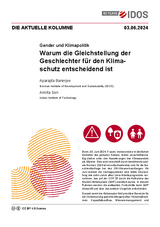The Current Column
Gender and Climate Action
Why attaining gender equality is critical for climate action
Sen, Amrita / Aparajita BanerjeeThe Current Column (2024)
Bonn: German Institute of Development and Sustainability (IDOS), The Current Column of 3 June 2024
Bonn, 3 June 2024. Women, especially in rural areas in the Global South, suffer disproportionally more from the effects of climate change than men. Existing social norms, unfortunately, exacerbate gender-specific climate vulnerabilities of women. 2024 is a critical year for gender in the UN Climate Change negotiations. Beginning in June, Parties will undertake a final review of the decade-old Lima Work Programme adopted at the COP 20 and enhanced at the COP 25 by including the Gender Action Plan (GAP). This comprehensive review will take stock of the global progress on GAP and decide on the way forward.
Currently, the GAP identifies five priority areas for enhancing gender-responsive climate action: capacity-building, knowledge management, and communication; gender balance, participation, and women’s leadership; coherence; gender-responsive implementation and means of implementation; and monitoring and reporting. A concerted effort by the GAP is showing noticeable progress. 75% of the Nationally Determined Contribution and 97% of National Adaptation Plans have mentions of gender. Even then, gender-responsive climate action has a long road ahead. The five GAP identified priority areas remain challenging to implement as socio-politically entrenched gender inequities continue in many countries. Therefore, attaining gender equality is a prerequisite for gender-responsive climate action.
The challenges of implementing gender-responsive provisions in the Scheduled Tribes and Other Traditional Forest Dwellers (Recognition of Forest Rights) Act 2006, or FRA, are an enlightening example of why addressing gender inequality is key for any gender-responsive policy. FRA is a landmark statutory law in India that aims to grant land ownership rights and forest management powers to forest-dependent communities. It is the first legal provision to safeguard multiple customary rights of forest-dependent communities, historically denied by a collective of forest governance laws since India’s independence. Gender-responsive provisions include joint land titles, recognising women’s land claims in single-headed households, and mandating that one-third of members in decentralised institutions such as forest rights committees be female. However, such an emancipatory mandate, seeking to ‘undo the historical injustices,’ is still far from being gender-effective after nearly two decades.
The main reason the FRA lacks teeth is the difficulty in penetrating the sociocultural contexts. In India, many women, often from indigenous backgrounds, are forest dependent- primarily for sourcing fuelwood and non-timber forest products. These women frequently lack knowledge of FRA’s gender provisions. Agency and participation get complicated as indigenous women have traditionally featured in the lowest rung of society based on race and caste-based inequities. Civil society organisations often fail to facilitate such provisions for women. Gender empowerment is a long-term and continuous process that requires challenging sociocultural norms that shape gender-specific social expectations.
Without precise mechanisms and structural procedures within regulations to realise gender equality, undoing the socially embedded complex unequal gender norms is difficult. Even though FRA guarantees some form of gender-based participation, traditional gender perceptions make it difficult for women to engage and influence policy decisions. Participation in consultations may not necessarily translate into influencing policy outcomes. At times, participating in consultations becomes challenging as rural women often wear multiple hats. Acting as caregivers, fuel wood collectors, water collectors, and participating in myriad domestic chores of rural life devoid of many modern amenities leave them with little time to participate in processes that do not ensure tangible outcomes.
Lessons from the limited success of FRA to make significant impacts as a gender-responsive policy can inform gender-responsive climate action policies. Identifying and addressing deeply underlying structural barriers that often support, encourage, and even reinforce gender inequality is critical. Women taking up leadership roles in climate action would require structural changes in societies where women can reclaim their rights of self-expression. However, such radical changes take time. Simultaneously enhancing and upscaling opportunities for those less empowered to contribute and influence, albeit on limited scales, is necessary. Gender-responsive climate action would require much work on the basics, like education, financial independence, and creating opportunities to learn soft skills. These are often ignored in highly technocratic policy solutions. However, failing to address gender inequality, legal provisions that are even transformational in spirit, would fail to materialise gender-responsive climate action in letters.
Dr Amrita Sen, Assistant Professor, Indian Institute of Technology, Kharagpur (India)
Dr Aparajita Banerjee, Senior Researcher, IDOS, Bonn (Germany)

